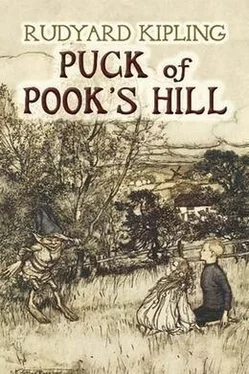Rudyard Kipling - Puck of Pook's Hill
Здесь есть возможность читать онлайн «Rudyard Kipling - Puck of Pook's Hill» весь текст электронной книги совершенно бесплатно (целиком полную версию без сокращений). В некоторых случаях можно слушать аудио, скачать через торрент в формате fb2 и присутствует краткое содержание. Год выпуска: 2014, Издательство: epubBooks Classics, Жанр: Фэнтези, на английском языке. Описание произведения, (предисловие) а так же отзывы посетителей доступны на портале библиотеки ЛибКат.
- Название:Puck of Pook's Hill
- Автор:
- Издательство:epubBooks Classics
- Жанр:
- Год:2014
- ISBN:нет данных
- Рейтинг книги:3 / 5. Голосов: 1
-
Избранное:Добавить в избранное
- Отзывы:
-
Ваша оценка:
- 60
- 1
- 2
- 3
- 4
- 5
Puck of Pook's Hill: краткое содержание, описание и аннотация
Предлагаем к чтению аннотацию, описание, краткое содержание или предисловие (зависит от того, что написал сам автор книги «Puck of Pook's Hill»). Если вы не нашли необходимую информацию о книге — напишите в комментариях, мы постараемся отыскать её.
Puck of Pook's Hill — читать онлайн бесплатно полную книгу (весь текст) целиком
Ниже представлен текст книги, разбитый по страницам. Система сохранения места последней прочитанной страницы, позволяет с удобством читать онлайн бесплатно книгу «Puck of Pook's Hill», без необходимости каждый раз заново искать на чём Вы остановились. Поставьте закладку, и сможете в любой момент перейти на страницу, на которой закончили чтение.
Интервал:
Закладка:
'How? Thus. There was water to fetch from the shore when we could find it, as well as wild fruit and grasses, and sand for scrubbing of the decks and benches to keep them sweet. Also we hauled the ship out on low islands and emptied all her gear, even to the iron wedges, and burned off the weed, that had grown on her, with torches of rush, and smoked below the decks with rushes dampened in salt water, as Hlaf the Woman orders in her Ship–Book. Once when we were thus stripped, and the ship lay propped on her keel, the bird cried, "Out swords!" as though she saw an enemy. Witta vowed he would wring her neck.'
'Poor Polly! Did he?' said Una.
'Nay. She was the ship's bird. She could call all the rowers by name…. Those were good days—for a wifeless man—with Witta and his heathen—beyond the world's end…. After many weeks we came on the great Shoal which stretched, as Witta's father had said, far out to sea. We skirted it till we were giddy with the sight and dizzy with the sound of bars and breakers, and when we reached land again we found a naked black people dwelling among woods, who for one wedge of iron loaded us with fruits and grasses and eggs. Witta scratched his head at them in sign he would buy gold. They had no gold, but they understood the sign (all the gold–traders hide their gold in their thick hair), for they pointed along the coast. They beat, too, on their chests with their clenched hands, and that, if we had known it, was an evil sign.'
'What did it mean?' said Dan.
'Patience. Ye shall hear. We followed the coast eastward sixteen days (counting time by sword–cuts on the helm–rail) till we came to the Forest in the Sea. Trees grew there out of mud, arched upon lean and high roots, and many muddy waterways ran all whither into darkness, under the trees. Here we lost the sun. We followed the winding channels between the trees, and where we could not row we laid hold of the crusted roots and hauled ourselves along. The water was foul, and great glittering flies tormented us. Morning and evening a blue mist covered the mud, which bred fevers. Four of our rowers sickened, and were bound to their benches, lest they should leap overboard and be eaten by the monsters of the mud. The Yellow Man lay sick beside the Wise Iron, rolling his head and talking in his own tongue. Only the Bird throve. She sat on Witta's shoulder and screamed in that noisome, silent darkness. Yes; I think it was the silence we most feared.'
He paused to listen to the comfortable home noises of the brook.
'When we had lost count of time among those black gullies and swashes we heard, as it were, a drum beat far off, and following it we broke into a broad, brown river by a hut in a clearing among fields of pumpkins. We thanked God to see the sun again. The people of the village gave the good welcome, and Witta scratched his head at them (for gold), and showed them our iron and beads. They ran to the bank—we were still in the ship—and pointed to our swords and bows, for always when near shore we lay armed. Soon they fetched store of gold in bars and in dust from their huts, and some great blackened elephants' teeth. These they piled on the bank, as though to tempt us, and made signs of dealing blows in battle, and pointed up to the tree–tops, and to the forest behind. Their captain or chief sorcerer then beat on his chest with his fists, and gnashed his teeth.
'Said Thorkild of Borkum: "Do they mean we must fight for all this gear?" and he half drew sword.
'"Nay," said Hugh. "I think they ask us to league against some enemy."
'"I like this not," said Witta, of a sudden. "Back into mid–stream."
'So we did, and sat still all, watching the black folk and the gold they piled on the bank. Again we heard drums beat in the forest, and the people fled to their huts, leaving the gold unguarded.
'Then Hugh, at the bows, pointed without speech, and we saw a great Devil come out of the forest. He shaded his brows with his hand, and moistened his pink tongue between his lips—thus.'
'A Devil!' said Dan, delightfully horrified.
'Yea. Taller than a man; covered with reddish hair. When he had well regarded our ship, he beat on his chest with his fists till it sounded like rolling drums, and came to the bank swinging all his body between his long arms, and gnashed his teeth at us. Hugh loosed arrow, and pierced him through the throat. He fell roaring, and three other Devils ran out of the forest and hauled him into a tall tree out of sight. Anon they cast down the blood–stained arrow, and lamented together among the leaves.
Witta saw the gold on the bank; he was loath to leave it. "Sirs," said he (no man had spoken till then), "yonder is what we have come so far and so painfully to find, laid out to our very hand. Let us row in while these Devils bewail themselves, and at least bear off what we may."
'Bold as a wolf, cunning as a fox was Witta! He set four archers on the foredeck to shoot the Devils if they should leap from the tree, which was close to the bank. He manned ten oars a–side, and bade them watch his hand to row in or back out, and so coaxed he them toward the bank. But none would set foot ashore, though the gold was within ten paces. No man is hasty to his hanging! They whimpered at their oars like beaten hounds, and Witta bit his fingers for rage.
'Said Hugh of a sudden, "Hark!" At first we thought it was the buzzing of the glittering flies on the water; but it grew loud and fierce, so that all men heard.'
'What?' said Dan and Una.
'It was the Sword.' Sir Richard patted the smooth hilt. 'It sang as a Dane sings before battle. "I go," said Hugh, and he leaped from the bows and fell among the gold. I was afraid to my four bones' marrow, but for shame's sake I followed, and Thorkild of Borkum leaped after me. None other came. "Blame me not," cried Witta behind us, "I must abide by my ship." We three had no time to blame or praise. We stooped to the gold and threw it back over our shoulders, one hand on our swords and one eye on the tree, which nigh overhung us.
'I know not how the Devils leaped down, or how the fight began. I heard Hugh cry: "Out! out!" as though he were at Santlache again; I saw Thorkild's steel cap smitten off his head by a great hairy hand, and I felt an arrow from the ship whistle past my ear. They say that till Witta took his sword to the rowers he could not bring his ship inshore; and each one of the four archers said afterwards that he alone had pierced the Devil that fought me. I do not know. I went to it in my mail–shirt, which saved my skin. With long–sword and belt–dagger I fought for the life against a Devil whose very feet were hands, and who whirled me back and forth like a dead branch. He had me by the waist, my arms to my side, when an arrow from the ship pierced him between the shoulders, and he loosened grip. I passed my sword twice through him, and he crutched himself away between his long arms, coughing and moaning. Next, as I remember, I saw Thorkild of Borkum, bare–headed and smiling, leaping up and down before a Devil that leaped and gnashed his teeth. Then Hugh passed, his sword shifted to his left hand, and I wondered why I had not known that Hugh was a left–handed man; and thereafter I remembered nothing till I felt spray on my face, and we were in sunshine on the open sea. That was twenty days after.'
'What had happened? Did Hugh die?'the children asked.
'Never was such a fight fought by christened man,' said Sir Richard. 'An arrow from the ship had saved me from my Devil, and Thorkild of Borkum had given back before his Devil, till the bowmen on the ship could shoot it all full of arrows from near by; but Hugh's Devil was cunning, and had kept behind trees, where no arrow could reach. Body to body there, by stark strength of sword and hand, had Hugh slain him, and, dying, the Thing had clenched his teeth on the sword. Judge what teeth they were!'
Читать дальшеИнтервал:
Закладка:
Похожие книги на «Puck of Pook's Hill»
Представляем Вашему вниманию похожие книги на «Puck of Pook's Hill» списком для выбора. Мы отобрали схожую по названию и смыслу литературу в надежде предоставить читателям больше вариантов отыскать новые, интересные, ещё непрочитанные произведения.
Обсуждение, отзывы о книге «Puck of Pook's Hill» и просто собственные мнения читателей. Оставьте ваши комментарии, напишите, что Вы думаете о произведении, его смысле или главных героях. Укажите что конкретно понравилось, а что нет, и почему Вы так считаете.












